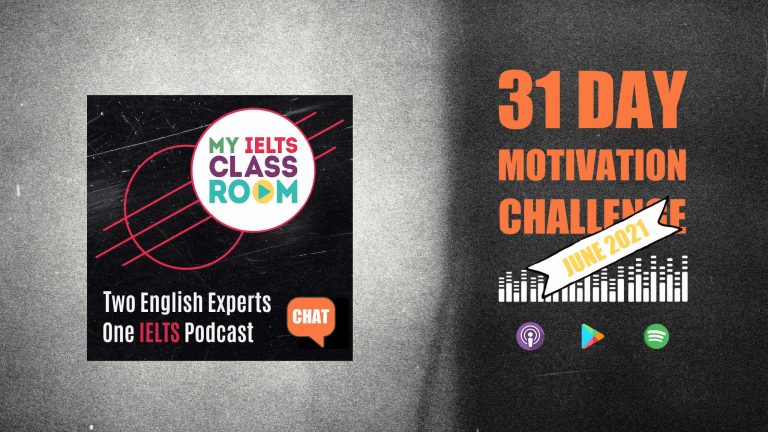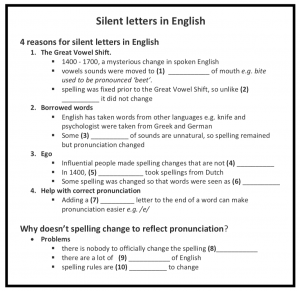
Join our June 2021 IELTS Motivation Challenge!
Join our June 2021 IELTS Motivation Challenge
In May last year, Nick and I undertook a 31-day IELTS Motivation Challenge. Our aim was to kick-start our students into good study habits, but we found that we made some positive changes in our own lives too. Now, it’s a year later and we have a whole new set of listeners who we think can benefit from taking part in a new IELTS motivation challenge (plus, Nick and I have definitely slipped back into some old bad habits, so could do with a new challenge too!)
So, today, why not pledge to join us as we set out to conquer new challenges in June 2021? All you have to commit to is adding two things positive habits to your day and taking two negative ones away. Plus, I will help you by posting one simple IELTS practice activity on our Facebook page every day through the month of June. If you have been looking for a simple way to kick-start or re-start your IELTS preparation, then our IELTS motivation challenge 2021 is it!
Below, you can find a summary of the episode, which includes all of the links to useful materials and the times of each part of the discussion (so you can go directly to the part you want to listen to). You can also find every episode of the podcast here 🚀
Subscribe to My IELTS Classroom podcast on Apple podcasts here
Subscribe to My IELTS Classroom on Google podcasts here
Episode Summary: 30 Day IELTS Motivation Challenge 2021
00:00 – 02:38 Introduction (Nick is not buying a flat!)
02:38 – 29:52 5 motivational lessons from our own lives
Last year, Nick and I kicked off the motivational challenge by outlining some classic motivational techniques such as visualising your future, or giving yourself a reason not to fail. These are all great, and we strongly recommend that you go back and listen to them here if you are looking for extra motivation.

However, this year, I thought that we would do something different. Instead of looking to other people for motivation, Nick and I talk about 5 ways that we have recently found motivation in our own lives (in the hop that it can help you too!) We discuss
- the importance of giving yourself credit for the thing that you have done (rather than focusing on the things you haven’t)
- how lists can help you to achieve your goals
- why sometimes we may need external help to motivate ourselves
- how eating those frogs really does help you move forward (and if you don’t know what this means, you can listen to this episode) 🐸
- why success doesn’t always follow a straight line
29:53 – END Join our 31-Day IELTS motivation Challenge in June 2021
Hopefully by now, you are feeling pumped up enough to join our IELTS Motivation Challenge! It really is very simple. All you need to do is commit to making small achievable changes to your routine for 30 days in a row this June. If you do, they those changes should become lifelong habits!
We are committing to choosing two “good” habits to add to our daily routine, and two “bad” habits to remove.
Remember, our goal is to create new ACHIEVABLE habits, so choose things that you know are manageable. There are no “right” changes, so just spend a few minutes now thinking what you can add or take away that will make you feel good about yourself and help you to move forward to achieve your IELTS goal (or any goal that you want to achieve!). Here are some ideas for things that you could add or remove from your life over the next 30 days:
Things you can add for the 30 day IELTS Motivation Challenge
- Complete one of my blog lessons every day – don’t worry about the order, don’t make notes, just read one and absorb the information. http://blog.myieltsclassroom.com
- Think of ideas for ONE essay every day – you can find the latest reported essay questions here
- Spend 15 minutes reviewing an old reading or listening test to assess why you got questions wrong.
- Learn one word from a reading or listening test that you previously didn’t understand (write them down in your vocabulary book).
- Listen to a podcast every day (or even part of a podcast – it is OK to just listen for 10 or fifteen minutes!). You can find my favourite podcasts here.
- Read an article from a good quality newspaper like the Independent or Guardian (try to find articles that focus on science or culture rather than current affairs).
- Revise one grammar point each day (or spend 10 minutes on grammar each day).
- Move your body for 30 minutes each day – you can walk, you can exercise, you can play with your kids, you can even just dance in your living room – if you move your body, your mind will also benefit.
Things you can remove for the 30 day IELTS Motivation Challenge
- Stop looking at YouTube for “quick fixes” for your IELTS mistakes.
- Don’t look at social media first thing in the morning or last thing at night.
- Stop telling yourself that it is impossible to pass IELTS or focusing on your previous failed tests – these are in the past and dwelling on them won’t help you.
- Stop doing Cambridge tests – spend the time learning new skills and language instead.
- Stop or reduce an unhealthy habit that is making you feel bad (maybe you can change your diet, smoke less, or stop talking to a person who makes you feel bad about yourself!).

Remember, to help you, we are going to be posting a IELTS practice activity on our Facebook page every day in June. To kick-start your month of motivation, I am publishing the first one here from the fantastic English with Stephen.
IELTS Motivation Challenge Day One
We all know that English spelling is difficult, but do you know why we have some many silent letters like in the words “knife” or “thumb“? Well, you can find out in this episode of English with Stephen. In just 8 minutes, Stephen goes through FOUR reasons why English spelling doesn’t always match English Pronunciation. Plus, to make this first task more “IELTS”, I have created some notes similar to those that you will find in IELTS Listening Part 4. As you listen, see if you can complete the ten missing words in the notes – put your answers in the comments and I will tell you if they are right or wrong! You should start at around 2 minutes 40 seconds.

